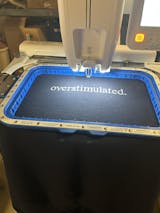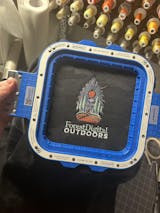1. Introduction to Large Hoop Embroidery
Imagine taking on a king-sized quilt, a bold wall banner, or a jacket back in one continuous stitch-out. That freedom comes from magnetic embroidery hoops. Oversized embroidery fields have transformed big-project workflows for pros and hobbyists alike—less rehooping, more precision, and cleaner results.
This guide unpacks the impact of large hoops: which machines offer the biggest embroidery fields, how they compare, and proven techniques to maximize speed and quality. You’ll also learn how accessories, software, and magnetic hooping systems expand what’s possible so you can scale production or dream bigger with confidence.
Table of Contents
- 1. Introduction to Large Hoop Embroidery
- 2. Top Machines with Largest Hoop Sizes
- 3. Practical Applications: Maximizing Efficiency
- 4. Repositional Hoop Mastery
- 5. Essential Accessories for Large-Hoop Success
- 6. Cost Analysis and Upgrade Paths
- 7. Troubleshooting Large-Hoop Challenges
- 8. Conclusion: Choosing Your Large-Hoop Solution
- 9. FAQ
2. Top Machines with Largest Hoop Sizes
The right hoop size defines your canvas. Bigger fields mean fewer stops and smoother production. Below are leading options, their specs, and why they excel on large-format projects.
| Machine Model | Hoop Dimensions | Stitch Speed | Key Features |
|---|---|---|---|
| Husqvarna Designer Epic 3 | 18.25" x 17.75" | 1,050 SPM | Largest commercial-grade hoop, WiFi/mySewnet, ribbon embroidery |
| Bernina Maxi Hoop | 8.2" x 15.7" | N/A | Twist-lock ratchet, endless embroidery, BERNINA 7/9 Series compatible |
| Janome MC550E | 8" x 14" | N/A | Magnetic hoop system, 180 built-in designs, ideal for banners |
| Brother PR1X/VE2300 | 8" x 12" | N/A | Ultrasonic sensor pen, Disney designs, budget-friendly |
2.1 Husqvarna Designer Epic 3: The Industry Leader
The Husqvarna Designer Epic 3 delivers an industry-leading 18.25" x 17.75" hoop—tailor-made for quilts, curtains, and commercial-scale tasks. Its 1,050 SPM speed balances throughput with stitch quality, while WiFi and mySewnet streamline design management. The ribbon embroidery attachment adds creative depth beyond thread-only work.
2.2 Bernina & Janome: Precision and Magnetic Innovation
Bernina’s Maxi Hoop (8.2" x 15.7") emphasizes accuracy and continuous design. The twist-lock ratchet maintains consistent tension, making it a favorite for endless borders and multi-motif layouts on BERNINA 7 and 9 Series machines.
Janome’s MC550E (8" x 14") spotlights magnetic hooping. Its magnetic system simplifies handling and reduces distortion, and with 180 designs plus six fonts, it’s versatile for banners, apparel, and home décor. Creators often note how magnetic hoops speed up setup and improve stitch consistency on elongated projects.
2.3 Brother and Commercial Multi-Needle Options
Brother’s PR1X (8" x 12") and VE2300 pair a beginner-friendly interface with features like an ultrasonic sensor pen and Disney designs—great for jacket backs, tablecloths, and medium-large items. Commercial brands such as Barudan and Ricoma offer multi-needle systems with higher speed and capacity; they typically trade easier learning curves for throughput that suits high-volume shops.
Trends and Advancements
Leading large-hoop solutions reduce rehooping and raise accuracy. Precision tension systems, cloud-integrated design management, and magnetic hooping technology make large-scale work more efficient and accessible.
3. Practical Applications: Maximizing Efficiency
Big hoops minimize stops, cut alignment errors, and unlock broader design possibilities across quilts, banners, apparel, and 3D items.
3.1 Quilts, Banners, and Home Décor
Large hoops (8" x 12" and up) enable intricate quilting across blocks and full-width banners with fewer hoop moves. Using design-splitting tools like Hatch’s Multi-Hooping Toolbox automates alignment and can drastically reduce rehooping, helping deliver polished, professional finishes.
Heavy-duty stabilizers are vital on thick fabrics such as quilts, towels, and curtains. Matching stabilizer type and weight to the fabric prevents puckering and keeps designs crisp.
3.2 Apparel and 3D Items: Jackets, Bags, Hats
On garments and 3D items, innovative hooping systems shine. Magnetic hoops for hats, sleeves, and layered fabrics deliver faster, more accurate placement. Garment-specific techniques with magnetic hoops for embroidery machines keep tension even and reduce distortion or hoop burn.
Freearm hooping (as in Bernina accessories) makes it possible to embroider tubular items without opening seams, streamlining custom apparel and accessory production.
4. Repositional Hoop Mastery
Repositional hoops let you stitch continuous, oversized designs beyond a single embroidery field—without sacrificing alignment.
4.1 Splitting and Aligning Continuous Designs
Step 1: Digitize and split. For a 5x12" repositional hoop, divide the artwork into overlapping 5x7" segments with about 0.5–1" overlap to avoid gaps.
Step 2: Mark with grid templates. Print or draw center lines and guides on your stabilizer for precise placement.
Step 3: Hoop and stitch by section. Align the first segment to your grid, stitch, then move the hoop to the next attachment points and repeat, loading the matching segment each time.
Step 4: Keep settings consistent. Apply any size or position tweaks uniformly across all segments.
Step 5: Troubleshoot proactively. Simplify dense overlaps, ensure taut hooping with suitable stabilizer, and minimize color changes where sections meet.
Pro tip: Ensure clear space behind the machine so the hoop can travel freely.
A creator example: A sweatshirt design split across two segments stitches cleanly by clipping excess fabric away and tracing each segment before stitching.
Don’t let a hoopmaster hooping station intimidate you. With careful planning and grid alignment, banners, borders, and oversized monograms come together seamlessly.
4.2 Machine-Specific Workflows
Brother (e.g., SE1900, PE535): Use pin-based positions (A, B, C, etc.), reattach per prompts, and load each split file individually with consistent settings.
Bernina: The MEGA Hoop slides to preset positions with on-screen guidance, helping reduce alignment guesswork.
Common pitfalls: Practice the motion between positions, use templates and center marks, and keep overlaps light to avoid thread buildup.
5. Essential Accessories for Large-Hoop Success
Accessories make or break big projects. The right hoops, stabilizers, and magnetic solutions turn complex items into reliable wins.
5.1 Freearm Hoops and Stabilizers
Freearm hoops let you embroider inside tubular items (bags, sleeves, T-shirts) without opening seams, and their ergonomic locking helps with precise placement. Pair them with the right stabilizers—cutaway for thick or stretchy materials, tearaway for lighter fabrics—for crisp, stable stitching. For extended reach and support across sizes, consider robust magnetic embroidery frames that maintain even pressure.
5.2 Magnetic Hoop Solutions
Sewtalent magnetic hoops deliver speed and precision for garments, with even clamping that adapts to fabric thickness. They can cut hooping time dramatically and reduce distortion and hoop burn. They’re often compared to a dime magnetic hoop for their efficiency and user-friendly alignment aids.
Bottom line: Freearm hoops are ideal for 3D items, and magnetic hoops excel on garments. Combined with the right stabilizer, they unlock reliable large-hoop results.
6. Cost Analysis and Upgrade Paths
Large-hoop embroidery is an investment. Understanding tiers, trade-offs, and ROI helps you scale wisely.
6.1 Home vs. Commercial Investment
The price spectrum ranges widely, from entry-level single-needle models to industrial, multi-head systems.
| Machine Tier | Hoop Size | Price Range | Key Features | Best For |
|---|---|---|---|---|
| Entry-Level (Home) | 4"x4"–5"x7" | $300–$700 | Single needle, basic designs | Hobbyists, small projects |
| Mid-Range (Semi-Pro) | 5"x7"–10"x6.3" | $5,000–$15,000 | Multi-needle, larger fields, auto thread change | Small businesses, medium runs |
| Industrial (Commercial) | 10"x6.3"+ | $19,995+ | Multi-head, 1,000+ SPM, specialty frames | High-volume, large-format work |
Upgrade paths typically move from compact home models toward larger fields and multi-needle automation as demand grows. Trade-offs include initial cost vs. scalability, needle count (manual vs. automated color changes), and speed.
ROI considerations: Switching to a magnetic frame for embroidery machine can yield significant time savings by speeding hooping and reducing material waste.
6.2 Budget Mid-Range Machines
Janome MC550E (~$3,000) offers an 8"x14" field, 180 designs, six fonts, and magnetic hooping—great for banners, quilts, and oversized apparel.
Brother PR1X provides an 8"x12" hoop, an ultrasonic sensor pen for placement, Disney designs, and an approachable interface for hobbyists.
These mid-range picks deliver ample space and features without the jump to industrial pricing.
7. Troubleshooting Large-Hoop Challenges
Big hoops magnify small mistakes. With proven techniques, you can prevent shifting, tension issues, and hoop burn.
7.1 Fabric Shifting and Tension Errors
Boost grip with non-slip inner rings or wrap plastic hoops with fabric or twill tape. Cut fabric larger than the design area, use quality cutaway stabilizer with adhesive or basting, and aim for taut, even hooping to avoid puckering. Dense or oversized designs often perform best on cutaway stabilizers.
7.2 Hoop Burn Prevention
Hoop marks can mar sensitive materials, especially on large fields. Even pressure is key—magnetic garment hoops minimize distortion and reduce hoop burn risk. If minor marks appear on your embroidery machine hoops, a little steam or a quick press helps relax fibers.
Use floating when needed, fuse stabilizer to the reverse side to reduce direct pressure, rotate the hoop during long runs, and keep the bobbin area and tension path clean to maintain smooth operation.
8. Conclusion: Choosing Your Large-Hoop Solution
Match your ambitions to your tools: consider project scale, budget, and the accessories that streamline hooping and alignment. For quilts and apparel, prioritize expansive hoops and appropriate stabilizers. If speed and consistency matter, focus on features that reduce rehooping and simplify design management.
9. FAQ
9.1 Q: What is the largest hoop size available for home embroidery machines?
A: The Husqvarna Designer Epic 3 offers an 18.25" x 17.75" hoop, ideal for quilts, banners, and other large-scale projects.
9.2 Q: Is there a steep learning curve when using repositional hoops for continuous designs?
A: With practice, the process is manageable. Grid templates and center marks aid precision, and many machines provide on-screen guidance.
9.3 Q: What stabilizer should I use when embroidering on denim or other thick fabrics?
A: A high-quality cutaway stabilizer provides robust support, reduces shifting, and helps maintain crisp results on large, dense designs.
9.4 Q: How do I upgrade from a 5x7" hoop to a larger size, and what should I consider?
A: Upgrading typically involves a machine that supports bigger fields. Consider your common projects, workspace, budget, compatibility, and accessory support.




